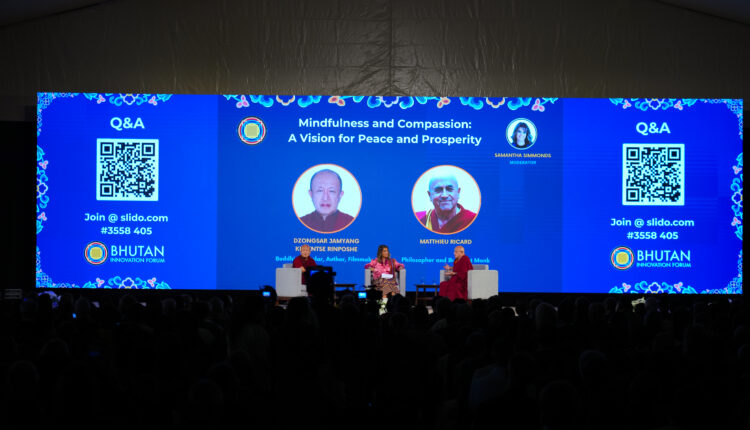Participants came from more than 60 nations

The highly anticipated Bhutan Innovation Forum kicked off on 1st October, welcoming 1,200 participants from nearly 60 countries.
The event opened with a traditional Chibdrel and Marchang ceremony, setting the tone for a day filled with transformative discussions on innovation, sustainability, and leadership.
The opening announcements were made by BBC News presenters Mark Lobel and Samantha Simmonds, followed by a keynote address by Bhutan’s Honourable Prime Minister, Tshering Tobgay, who expressed deep gratitude to His Majesty the King of Bhutan for leading this pioneering event.
The Prime Minister emphasised the importance of innovation in shaping Bhutan’s future, highlighting key national initiatives like the Dungkar Dzong, Bhutan Baccalaureate, and the Gelephu Mindfulness City (GMC). He urged participants to explore these themes, encouraging global collaboration in applying insights to their own communities.

Points for discussion
Discussions throughout the day underscored that innovation is pivotal to Bhutan’s future, touching on everything from urban development to education and workforce transformation.
Mindfulness, deeply embedded in Bhutanese culture, was presented as a tool to address global challenges like poverty, climate change, and inequality. Speakers Dzongsar Jamyang Khentse Rinpoche and Matthieu Ricard emphasised the integration of mindfulness with compassion and ethics to foster societal transformation.
At the event, The Gelephu Mindfulness City (GMC) emerged as a visionary project, combining modern technology with Bhutanese culture. Architect Bjarke Ingels showcased the design, which integrates sustainability, mindfulness, and economic clusters focused on wellness, technology, and nature.
With regard to leadership in the 21st century, Nobel laureate and former Colombian President Juan Manuel Santos provided a compelling perspective on leadership, peace processes, and the importance of long-term thinking in addressing global issues like climate change. His reflections on Colombia’s peace efforts served as lessons for future global leadership.
Speaking on education and lifelong training, Nobel laureate Joseph Stiglitz emphasised the need for a knowledge economy in Bhutan, underscoring the importance of lifelong learning and aligning economic development with Bhutan’s core values of Gross National Happiness (GNH).
The Bhutan Innovation Forum continues to be a powerful platform for dialogue, leadership, and action, merging Bhutan’s unique cultural values with global best practices to shape a mindful, innovative, and sustainable future for Bhutan and the world.